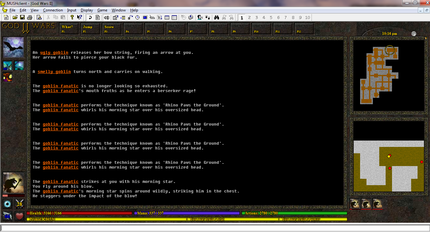 Imagine this: a cluttered room with clothes scattered on the floor. A long table in the far corner with two computer monitors, some high-tech looking equipment, and a man sitting at the table looking like he hasn’t showered or moved in a few days. You see that he has eaten because of the empty plates with remnants of food items that could have been pizza scattered around the table and on the floor. The first couple thoughts that run through your head probably include things like: “What a nerd,” or “He’s addicted…” or “Wow…he needs to shower!” While those statements may all be true, that’s not always the only thing that is happening in situations like these.
Imagine this: a cluttered room with clothes scattered on the floor. A long table in the far corner with two computer monitors, some high-tech looking equipment, and a man sitting at the table looking like he hasn’t showered or moved in a few days. You see that he has eaten because of the empty plates with remnants of food items that could have been pizza scattered around the table and on the floor. The first couple thoughts that run through your head probably include things like: “What a nerd,” or “He’s addicted…” or “Wow…he needs to shower!” While those statements may all be true, that’s not always the only thing that is happening in situations like these.
According to Sherry Turkle, a professor at the Massachusetts Institute of Technology, people often use virtual worlds to construct or reconstruct themselves. MUDs, which stand for Multi-User Dungeons, allow users to create whomever they want and pretend to be whoever they want to be. This can include things like physical features or personality traits. These users also have the ability to move through space and time. They can take control of their world and their identity in a way that they might not have been able to do in the real world. “Although virtual reality is not ‘real’, it has a relationship to the real,” says Turkle.
Often times, these users aren’t always just playing for fun. They use the virtual world as a way to reclaim control in their lives, or as a way to work through personal concerns and issues. Some individuals choose to virtually replay situations that have occurred in real life to be able to control the resolution. Others project their insecurities and play out their fantasies. The virtual world holds no limits or boundaries, allowing people to do what ever they want. In a sense the virtual world is an outlet to help people deal with the intricacies of their real life. There are virtual roleplaying platforms, other than MUDs, that allow people to interact with one another on the Internet – an example is Second Life.

Researchers at the Center for BrainHealth at The University of Texas at Dallas have developed a new treatment plan for individuals with social difficulties including people with Asperger’s and Autism involving virtual roleplaying games. The virtual realm allows these patients to practice and develop their social skills without worrying about how ‘real’ people will react. Some of the participants have shown encouraging results and improvements in social interactions.
Next time you come across a gamer immersed in a virtual world, don’t be so quick to judge their habits and actions. They may be dealing with things in their lives with ways that are different from others.
Images and Articles:
http://www.huffingtonpost.com/2014/10/29/autism-video-games_n_6056634.html
http://werkidsmentalhealth.ca/wp-content/uploads/2014/01/VideoGame-addiction.jpg
http://upload.wikimedia.org/wikipedia/en/f/fe/God_Wars_II_screenshot_of_dungeon_with_MUSHclient_plugin.png